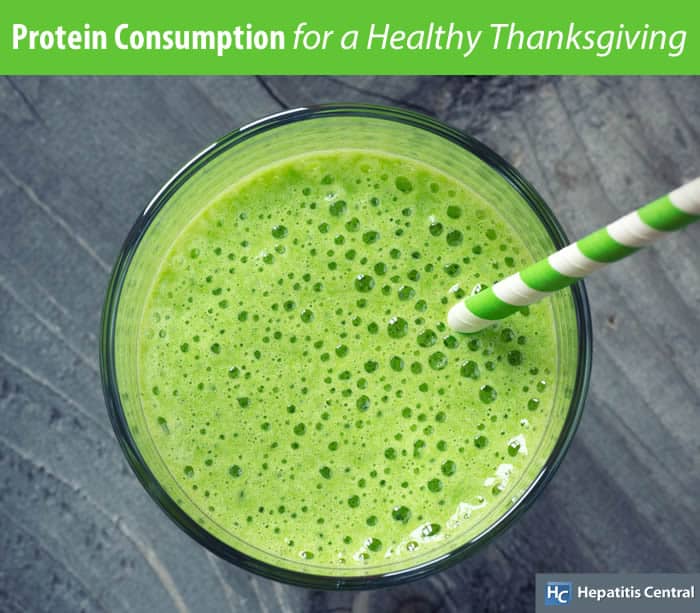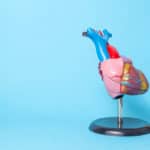Protein Consumption for a Healthy Thanksgiving


Thanksgiving is a joyful, food-centric holiday enjoyed by most Americans. Usually marked by a gluttonous feast as its celebrants give thanks for the recent harvest, Thanksgiving is the most frequently cited day when dietary cautions are thrown to the wind. Some common Thanksgiving foods are good for the body; others not so much.
For those with chronic Hepatitis C (or other liver ailment), taking care of their liver in the midst of a feast is a smart way to prevent liver disease progression. In addition to avoiding fatty and sugary dishes, consuming adequate quantities of protein can help support liver health.
Thanksgiving Food Division
In an effort to divide the foods on your Thanksgiving table into those that are liver-friendly and those that aren’t, it is important to understand the liver’s vulnerability to food. The liver essentially processes everything we eat or drink, helping to remove any toxins from the bloodstream. Foods that interfere with detoxification contribute to inflammation in the liver, which instigates liver damage. On the other hand, foods that neutralize inflammation protect against liver damage. In addition, some foods provide the raw materials to help re-build damaged liver cells.
Examples in each category include:
- Thanksgiving foods contributing to inflammation – Gravy made from pan drippings, buttery mashed potatoes, pumpkin, apple and pecan pies, sausage stuffing, fried onions, creamy vegetables, alcohol, candied yams and crispy turkey skin.
- Thanksgiving foods that neutralize inflammation – Steamed asparagus or collard greens, butternut squash soup (without cream), cranberry sauce (without sugar), baked sweet potato and baked apple (without sugar).
- Thanksgiving foods that help re-build injured liver cells – White turkey meat.
Protein, Turkey and the Liver
Hepatitis C provokes destruction of liver cells, which must be replaced to keep the liver functioning optimally. This replacement requires an adequate supply of the 20 protein building blocks, also known as amino acids. When the liver sustains damage from the Hepatitis C virus or another source of inflammation, it needs amino acids to repair those damaged cells. Experts agree that low fat or plant sources of protein are the best suppliers of reparative amino acids. Generally, red meat and full-fat dairy products are not the best choices because their unhealthy fat content initiates inflammation.
In addition to repairing injured liver cells, there are other benefits to protein consumption with Hepatitis C. According to Christie Hust, RD, an assistant professor of nutrition and diet at Texas Tech University Health Sciences Center in Lubbock, “It was once thought that people with liver disease should limit proteins, but research no longer supports this. You need proteins to keep fluid in your blood vessels and lower your risk of fluid retention.” By helping regulate fluid metabolism, protein is especially important for those with advanced liver disease who are greatly affected by fluid retention.
Lean Protein
Although Thanksgiving can be associated with over-indulgence of fattening and sugary foods, it doesn’t have to be. The star of the Thanksgiving feast is usually a turkey – a lean protein that is great for the liver (as long as it is the white meat without skin and not drenched in gravy). Turkey breast without the skin is ideal for those with Hepatitis C because it is low in fat, high in protein, filled with B vitamins (which helps the liver break down fats) and rich in selenium (a mineral that helps protect against liver cell damage).
Uric Acid
However, turkey may not be everyone’s first protein choice. Turkey contains purines, which are broken down in the body to form uric acid. Because high uric acid levels can lead to kidney stones or aggravate gout in susceptible individuals, these individuals should limit their consumption of turkey. In addition, vegetarians need to find plant-based sources of protein.
Pea Protein
Vegetarians do not eat fish, meat or poultry. Although there are several vegetarian sources of protein, pea protein stands out for liver health because it is fat-free, cholesterol-free, vegan, is not genetically modified, and has a low risk of allergy.
Derived from yellow split peas, pea protein is available in a powder and has many benefits to those with Hepatitis C. Pea protein helps slow the production of ghrelin in the stomach, which promotes weight loss. In addition, research has shown that pea protein helps lower blood pressure and cholesterol. If you are vegetarian or vegan and other plant-based sources of protein are not part of your Thanksgiving meal, there are two important reasons to begin your feast with a protein shake:
- It provides you with plenty of protein to help with liver cell regeneration.
- Because of pea protein’s slowing of ghrelin, your desire to overeat will be reduced.
The Thanksgiving meal is a time when many people veer off a nutritious path in favor of the many carbohydrate-rich, sugary treats on the holiday table. Besides choosing foods that reduce the likelihood of inflammation in the liver, those with Hepatitis C can help support their liver’s health by making sure they favor protein. Turkey breast is an ideal source of lean animal protein, making Thanksgiving an easy holiday to support liver cell reparation. However, even those who don’t eat turkey can get the same liver cell boost by including pea protein into their Thanksgiving Day plans.
http://www.everydayhealth.com/pictures/nutrition-tips-for-hepatitis-c/, 7 Diet and Nutrition Tips for a Healthy Liver, Chris Iliades, MD, Retrieved November 8, 2015, Everyday Health Media, LLC, 2015.
http://www.livestrong.com/article/251750-how-to-treat-hepatitis-c-with-nutrition/, How To Treat Hepatitis C With Nutrition, Dr. Tina M. St. John, Retrieved November 8, 2015, Demand Media, Inc., 2015.
http://www.liversupport.com/is-turkey-a-good-food-for-liver-health/, Is Turkey a Good Food for Liver Health?, Nicole Cutler, L.Ac., Retrieved November 8, 2015, Natural Wellness, 2015.
http://www.liversupport.com/the-advantages-of-consuming-protein-for-liver-health/, The Advantages of Consuming Protein for Liver Health, Nicole Cutler, L.Ac., Retrieved November 8, 2015, Natural Wellness, 2015.
http://www.lucindaporterrn.com/living-with-hepatitis-c-how-to-prepare-for-thanksgiving/, Living with Hepatitis C: How to prepare for Thanksgiving, Lucinda Porter, RN, Retrieved November 8, 2015, Lucinda K. Porter, RN, 2015.







